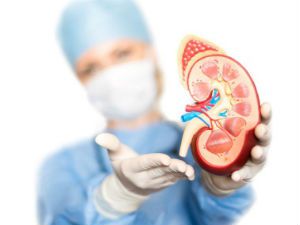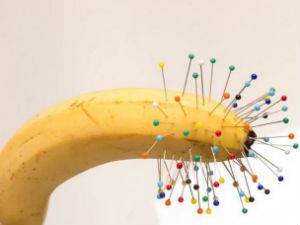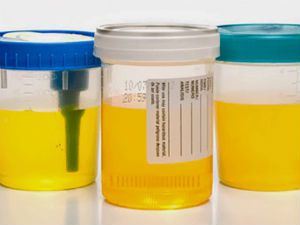Diseases of the genitourinary system is one of the first places in frequency of occurrence among the pathologies of the whole body. It equally affected both men and women.
Only the fairer sex often suffer from diseases of some organs but the male part of the population – from the defeat of others.
One of the first symptoms of disease and the bell, which should be a signal for treatment to the treating physician, is the feeling that urine is not until the end comes out of the bladder.
The physiology of urination
Urine consists of water and various elements that occur in the organism due to metabolic processes. The kidneys filter the blood from harmful substances and excess fluid, banishing her in special tubules-tubules, and then send the finished urine into the bladder through two long tubes, the ureters.
The ureters fall into the cavity of the bladder. There’s no sphincter, so they are always open, and the urine continuously drains into the bladder. When enough liquid (usually it is 200-300 ml), then folds on the walls are stretched and stimulate specific receptors.
They, in turn, send a signal to the spinal cord about the fullness of the body. The neurons of the spinal cord process the information and send a response to the muscles and internal sphincter to relax
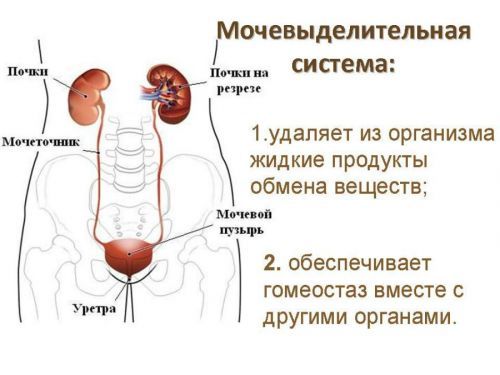
Thus, the urine begins to flow into the urethra, and the person feels a need to visit the toilet. If the ability to immediately empty the bladder is absent, then the person may for some time to hold urine in the urethra, clenching his muscles and closing of the external sphincter.
Diseases of the genitourinary system, and in some cases with involvement of other organs may occur disorders at all stages of secretion and excretion of urine. For example, when abnormalities of the innervation signals that provoke relaxation of the bladder muscles, can come when the body will have not filled on a full. And if prostatitis or BPH in men there are difficulties in the process of urinating and frequent urge to it.
Causes unpleasant symptoms
Of the reasons that urine is not completely out of the bladder very much, only an experienced professional can make a differential diagnosis and to appoint correct treatment. This is due to the fact that the pathological process does not necessarily have to be concentrated in the bladder to cause unpleasant symptoms.
In most cases, the feeling that not all urine has left the body, occurs under the following conditions:
- Benign prostatic hyperplasia (BPH) or prostatitis – occurs only in the male population. Other symptoms may be easing the pressure of urine and pain when emptying. In addition, such patients is difficult to begin to produce urine.
- The cystitis is an inflammatory process in the walls of the bladder. Can develop in men and women. But most of this disease affects women. This is due to the fact that the urethra of girls is several times shorter than in the male, therefore, pathogenic microflora is easier to penetrate into the body.
- Calculous education, in other words, stones in the bladder. Pathology is accompanied by drawing pains in the abdomen, blood admixtures in the urine, and in the case when the stone overlaps the outlet channel, there is ischuria acute urinary retention.
- Urethritis is a disease characterized by inflammation of the mucous membrane of the urethra. Manifested cutting pain in the urethra area and an unpleasant discharge from her.
- Syndrome overactive bladder – a condition in which the receptors located in the folds react and send a signal to the spinal cord even with a slight stretching of the walls of liquid.
- Benign or cancer processes in the bladder, accompanied by the appearance of tumors which irritate the walls of the body, or take up much space.
This condition is associated with nervous system pathologies and diseases of the spinal cord:
- sciatica;
- acute phase of multiple sclerosis or running form;
- hernias that occur in the spinal cord responsible for the innervation of the pelvic organs;
- back injury.
Also quite frequently to disturbances in the control organ of the nervous system can cause diabetes.
The reason that urine is not completely out, and part of it is left in the bladder can also become the following pathology:
- stricture of channels through which the urine comes out (narrowing or fusion of the walls);
- hypotension or complete lack of tone of the organ;
- a tumor that compresses the bladder.
It’s not uncommon to excessive irritation and feeling of populatenode lead to diseases of organs located in the pelvis:
- women can be salpingoophoritis, that is, inflammation of the uterine appendages – ovaries and fallopian tubes;
- inflammation of the Appendix;
- pelvioperitonit;
- inflammation in a thin and/or large intestine.
If the bladder empties poorly, it can cause hyperextension of its walls. In such cases, patients begin to complain of aching or dragging pain in the abdomen, recurrent feeling of heaviness and fullness above the pubes. In addition, if the body is stretched and greatly increased in size, it can be felt during palpation of the abdomen.
Stagnant urine is a perfect environment in which almost immediately settle down and begin to proliferate a variety of pathogenic microorganisms. Therefore, patients with this problem often have urethritis, cystitis and pyelonephritis.
How to identify the cause
Since these signs can indicate many diseases, to self-medicate is not worth it. When there is a feeling of incomplete release of the bubble as soon as possible to consult a doctor. Because only an experienced specialist are able to understand, to find the true cause and prescribe the correct treatment.
Inflammation of the urinary organs
Most often diseases occur in women. They are characterized by cutting pains, burning sensation and intense pain when trying to urinate. In the case of pyelonephritis, the pain may be localized in the lower back. Urine becomes whitish, turbid and cereal.
Prostate disease
Can cause only men, because women are simply missing problem on. Usually from the male population, the prostate grows throughout life, and to 55-60 years big enough to begin to squeeze a channel through which urine comes out. Patients also complain of pain, but often joins such problem as impotence.
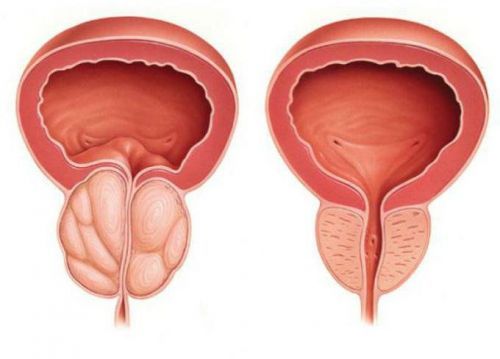
With age, the prostate can grow and block the urethra
If you develop prostate cancer (adenocarcinoma), the patient begins to rapidly lose weight and body temperature constantly remains within 37-37,5 degrees.
Stones
In the presence of calkulezny formations in any Department of the genitourinary system in patients in the anamnesis necessarily to be writing about renal colic. Also, patients will complain of severe back pain, and their urine is turbid, sometimes with the admixtures of blood. In some cases it will be possible to notice the sand – crystals of salts.
Neurogenic bladder
Patients are unable to move away from the toilet, the need to urinate is felt almost all the time. The disease develops gradually, the first symptoms are minor, but increasing each day.
Diagnosis
What to do when there is a feeling that the bladder remain liquid after urination? You need to consult your doctor, who will conduct the inspection and send already to more narrow specialist, urologist, andrologist, etc.
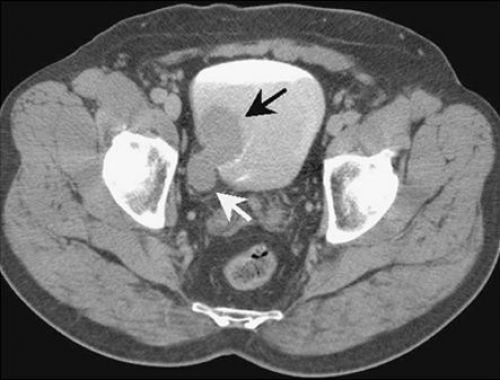
For diagnosis, the doctor will prescribe a number of additional studies:
- a General analysis of capillary blood (blood from finger);
- urine;
- bacteriological examination of urine (sowing life-giving environment in order to grow microorganisms that may be in the urine);
- ultrasonic examination of organs located in the pelvis, and kidneys;
- contrast retrograde or intravenous urography;
- the cystoscopy.
In severe cases, when it is hard to determine the diagnosis, your doctor may prescribe more serious and expensive methods – magnetic resonance imaging, radionuclide studies, etc
How to get rid of unpleasant symptoms
To minimize unpleasant feelings during and after urination, you can use the following techniques:
- You need to take a comfortable position on the toilet and try to relax, especially the muscles of the pelvic floor. To sit in this state for about 5 minutes. This exercise will help bring more urine.
- To force the bladder to contract better and being more output urine, you need to press a little above the pubic area with your hand during urination.
- You can open the tap water. A gurgling sound reflex relaxes the muscles and stimulates emptying.
- You can also urinate in a bucket with hot water from which steam comes. But you have to be careful not to burn the mucous membrane of the genital organs.
In addition, doctors recommend drinking diuretics, and folk medicine uses various herbs which promote the excretion of urine. From healing herbs to make different tinctures, decoctions, and more. But such treatment usually lasts a long time, it is desirable to combine traditional methods.

